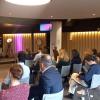
CircEUlar in collaboration with fellow EU Horizon project PRISMA (Net-Zero Pathway Research Through Integrated Assessment Model Advancements) held a stakeholder workshop on 14th March 2024, bringing together experts and decision-makers from industry, policy and civil society to discuss circular strategies in the areas of digitalisation, mobility, and buildings.
Hosted at PRISMA partner Bruegel’s offices in Brussels, the event opened in a plenary with insightful presentations from research partners on the potential role of circularity in working towards net-zero greenhouse gas emissions in Europe, and how CircEUlar and PRISMA are bringing research from different disciplines together to tackle this question. Further presentations looked in depth at digitalisation as an enabler for circular economy and net-zero strategies, mobility as an aspect of everyday life where circularity can be fostered though social and material changes, and buildings and household services’ enduring role in our emissions and the need for accurate data to promote circularity in the built environment.
The plenary was followed by a lunch break where participants were encouraged to network and engage with “food for thought” questions linked to the information presented. After lunch participants were split into three break-out groups focusing on digitalisation, mobility, and buildings where potential narratives for a future net-zero Europe were discussed. Participants identified the key actions, challenges and opportunities presented by various approaches towards a circular economy and highlighted cross-cutting themes that could be further explored in the project going forward.
Some of the key take-aways to feed into the research framework and circular economy narratives were to:
- Ensure that actions suggested are low-risk and as easy to implement as possible for citizens and organisations,
- Not underestimate the lifestyle changes being asked of citizens and consumers which may be both an opportunity and a challenge for implementing more circular actions,
- Address the need to cultivate new social and legal norms,
- Think about how rural and suburban areas can be incentivised to adopt circular practices,
- Ensure that the political and policy landscape is primed for the specific circular actions proposed,
- Embed circular design in products from the start,
- Consider the role standards can play in fostering changes towards circularity (e.g., LCA, ISO)
- Capitalise on cross-product, cross-country and cross-industry initiatives like Extended Product Responsibility rather than working in silos
“Developing a better understanding on the issues that companies, industry associations, policy makers and different civil society actors factors face on the ground was extremely useful to improve the framing and utility of our research over the next couple of years”, summarises Volker Krey, research groups leader at IIASA who is involved in both projects.
The exchange of ideas, best practice examples and collaboration across sectors achieved, resulted in a wealth of additional context insights that will inform and enhance the research in both the CircEUlar and PRISMA projects. As the stakeholder community around CircEUlar continues to grow, we are looking forward to additional engagement opportunities, sharing project results and gathering further insights.
Upcoming Events
Potsdam Institute for Climate Impact Research (PIK) & Online
German IIASA Networking Event: "Systems analysis for a sustainable and peaceful future"
Online and Austrian Academy of Sciences (Doktor-Ignaz-Seipel-Platz 2, Vienna)
Human Agency to Navigate the Anthropocene
Humboldt University of Berlin





